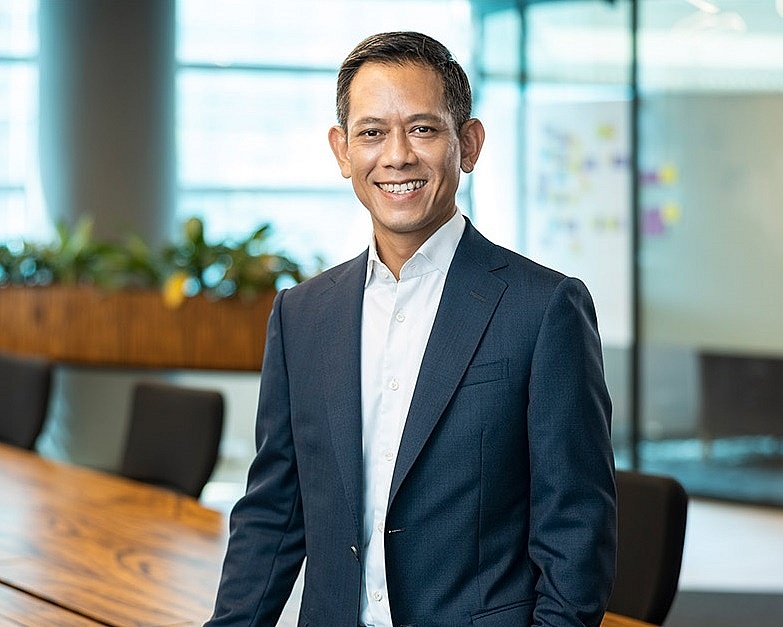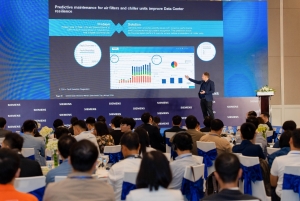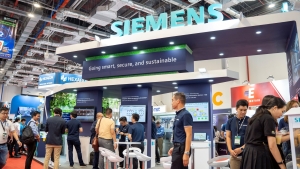Siemens collaboration unlocks the power of GenAI
How is Siemens Industrial Copilot performing?
Siemens Industrial Copilot, an AI-powered assistant developed in collaboration between Siemens and Microsoft, promises to boost productivity and efficiency across the industrial lifecycle. It will allow users to rapidly generate, optimise and debug complex automation code, and significantly shorten simulation times.
 |
| Dr. Pham Thai Lai, CEO of Siemens ASEAN and Vietnam |
We are rolling in a new era of industrial innovation. Imagine having an invaluable assistant by your side, wherever you are, guiding you through complex tasks like writing and optimising code for machines, and troubleshooting errors. That’s precisely what Siemens Industrial Copilot does for software engineers.
This has the potential to revolutionise the way companies design, develop, manufacture, and operate. Making human-machine collaboration more widely available allows engineers to accelerate code development, increase innovation and tackle skilled labour shortages.
Satya Nadella, chairman and CEO of Microsoft, has also said that with this next generation of AI, we have a unique opportunity to accelerate innovation across the entire industrial sector. Microsoft is building on its longstanding collaboration with Siemens and bringing together AI advances across the Microsoft Cloud with Siemens’ industrial domain expertise to empower both frontline and knowledge workers with new, AI-powered tools, starting with Siemens Industrial Copilot.
Could you elaborate on the cooperation between Siemens and Microsoft on Siemens Industrial Copilot?
Siemens Industrial Copilot exemplifies how partnerships and strong ecosystems can lead to transformative solutions and sustainable growth potential. Together with Microsoft, our shared vision is to empower customers with the adoption of Generative AI (GenAI).
In a deeper dialogue with Nadella, we characterise our joint efforts as a virtuous circle that fosters both innovation and sustainability. Nadella himself also echoes this sentiment, noting the reciprocal nature of our partnership: it’s a cycle of progress, where our AI advancements supported by a sustainable supply chain enable the creation of greener industrial solutions.
Siemens Industrial Copilot is a result of this strong partnership between Siemens and Microsoft. The AI-driven Copilot - interface and reasoning machine at the same time - supports and enhances certain capabilities. Its purpose is to be a companion, to support and augment users, to help define the standard for man-machine collaboration in the world’s factories.
Maintenance staff can chat in natural language with a faulty machine’s Copilot, ask for details and discuss solutions for the problem as if they were discussing them with colleagues. Furthermore, addressing the shortage of skilled workers, the focus is on automating tedious repetitive tasks.
For instance, a lot of automation code is standard code that is repeatedly used but needs to be programmed from scratch each time, resulting in wasted time.
Siemens Industrial Copilot can not only replicate an automation code as many times as necessary in a matter of seconds but can also minimise bugs. By utilising the AI-based assistant, programmers can concentrate on that which truly makes a difference.
This intelligent allocation of human and machine effort streamlines processes and unleashes human creativity for the complex challenges, thereby accelerating the pace of innovation. As Siemens Industrial Copilot integrates deeper into the fabric of industrial operations, it will enhance current workflows and lay the groundwork for future advancements.
How can Siemens Industrial Copilot benefit industrial operations?
Already, the potential is being recognised. Take Schaeffler AG, a leading automotive supplier, which is among the first in the automotive industry to embrace GenAI in operations and the engineering phase. This helps its engineers to generate reliable code for programming industrial automation systems such as robots. In addition, the company intends to incorporate the Siemens Industrial Copilot during their own operations, aiming to significantly reduce downtimes, and also for their clients at a later stage.
According to Klaus Rosenfeld, CEO of Schaeffler Group, with this joint pilot, the group is stepping into a new age of productivity and innovation. The Siemens Industrial Copilot will help their team work more efficiently, reduce repetitive tasks, and unleash creativity.
Siemens Industrial Copilot will ingest automation and process simulation information from Siemens’ open digital business platform, Siemens Xcelerator, and enhance it with Microsoft’s Azure OpenAI Service. Customers maintain full control over their data, and it is not used to train underlying AI models.
Siemens Industrial Copilot exemplifies Siemens’ ambitious digital strategy to merge the real and digital worlds. Since the 1970s, industrial AI - that which is reliable, secure, and trustworthy - has been leveraged as part of this strategy. Its application in dynamic data centre cooling management, for example, is enhancing data centre operations and increasing their energy efficiency at the push of the button. AI-enabled applications, platforms and connectivity are making smart buildings smarter, and AI-powered automation is revolutionising how transport becomes more flexible, efficient and inclusive.
All of this represents a step towards the industrial metaverse, revolutionising the manufacturing landscape and beyond via direct human-technology interaction.
 | Siemens holds first Data Centre Day in Vietnam Siemens Vietnam on April 9 held Vietnam Data Centre Day in Hanoi, attracting more than 130 delegates including industry experts, thought leaders, technology providers, and government representatives. |
 | Siemens presents sustainable industrial innovations at VIMF 2024 Siemens showcased groundbreaking industrial solutions at the Vietnam Industrial & Manufacturing Fair 2024 (VIMF 2024), held from June 19 to 21 in Binh Duong province. |
What the stars mean:
★ Poor ★ ★ Promising ★★★ Good ★★★★ Very good ★★★★★ Exceptional
Related Contents
Latest News
More News
- The generics industry: unlocking new growth drivers (February 04, 2026 | 17:39)
- Vietnam ready to increase purchases of US goods (February 04, 2026 | 15:55)
- Steel industry faces challenges in 2026 (February 03, 2026 | 17:20)
- State corporations poised to drive 2026 growth (February 03, 2026 | 13:58)
- Why high-tech talent will define Vietnam’s growth (February 02, 2026 | 10:47)
- FMCG resilience amid varying storms (February 02, 2026 | 10:00)
- Customs reforms strengthen business confidence, support trade growth (February 01, 2026 | 08:20)
- Vietnam and US to launch sixth trade negotiation round (January 30, 2026 | 15:19)
- Digital publishing emerges as key growth driver in Vietnam (January 30, 2026 | 10:59)
- EVN signs key contract for Tri An hydropower expansion (January 30, 2026 | 10:57)

 Tag:
Tag:




















 Mobile Version
Mobile Version